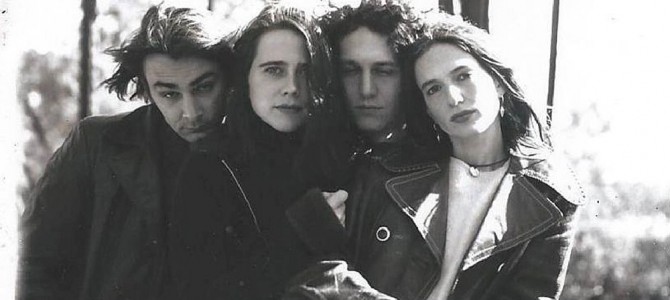
I don’t remember hearing Veruca Salt back in the day, but I do recall reading about them in Nickelodeon Magazine, which was basically the combined Pitchfork, GQ, and Daily Mail of those of us in the under-10 set circa 1997. The piece was one of those comparison features where two things go head to head and the writer tells us which is better—in this case, Veruca Salt or The Beatles. (I think it must have been occasioned by the release of “Eight Arms to Hold You,” the former’s second LP.)
The answer even then seemed obvious: of course that weirdo band my mom liked with the songs about pepper and being 64 was probably cooler than whoever these girls were. But the comparison was apt. The anonymous hack had hit on the most salient critical point, viz., that Nina Gordon and Louise Post were pop songwriters of a very high order who were only latching onto grunge because it was the idiom of the day, the same way that Shakespeare was when he wrote plays in blank verse rather than, say, epistolary novels.
If, like seven-year-old me, you haven’t listened to them, track down the recent vinyl reissue of “American Thighs” or, better yet, get a cassette of it, which should set you back about four bucks. Pop it in your Walkman, and get ready to rock. What will be clear after about 30 seconds is that Gordon and Post are using the classic KISS/Jesus and Mary Chain noise-pop template.
Step one: write what is basically a Supremes song. Step two: deck it out in fuzz but keep to a minimum the guitar noodling and other show-offy crap that Berry Gordy never would have allowed. Step three: rock immortality. It really is that simple. These luminaries reached the same conclusion that the makers of Blow Pops did ages ago: bubblegum is better with a little crunch.
Stuck In Your Head for Three Weeks Straight
I guarantee you that half of these songs will be stuck in your head for three weeks straight. Thematically, the girls are all over the place. “Seether” didn’t go anywhere near the pop charts, but, thank goodness, it at least hit number eight on Billboard Modern Rock Tracks, a rare triumph for the single worst format in the history of mainstream radio: it is the catchiest, most fun and unironic girl power anthem you’ll ever hear. (The fact that those dorks from Pretoria decided to pay homage to it is so painfully wrong and sad: it’s the rock equivalent of that weird social situation where the knuckle-dragging jock suddenly decides he likes the quiet valedictorian and she finds him revolting.)
“All Hail Me” is so full of rigteous misandrist angst and built on such dope riffs that regardless of your sex you’ll walk away from it wanting to punch the first man you see. “Forsythia” opens with a fat chorus pedal-laden riff worthy of “Come as You Are”; it also features vintage nonsensical “Wait, did they really just say that?” lyrics straight out of the Stephen Malkmus playbook:
Ohhh, Forsythia.
Spider monkey, a spider monkey is a good lie.
But I don’t know why.
If this track had appeared on side three of “Wowee Zowee” with the guitars cleaned up and half the words spoken by Bob Nostanovich, indie-rock nerds would be fighting on eBay for the rare alternate version that was issued only as a seven-inch. Not giving them props is pretty much the definition of sexism.
Robert Christgau, the only old-guard rock critic to come out of the ’90s with his reputation intact (seriously, though: Greil Marcus has never written one word about Pavement and thinks Beyoncé is the new Diana Ross, probably because she’s been on the cover of Rolling Stone so many times) got it right in his column when he asked defiantly, “Who cares whether it’s ‘real’ or not?” Tell ’em, Robbie!
Their reputation as far as I’m concerned is firmly established. The only question that remains is how they managed to avoid a lawsuit from the Roald Dahl estate. Can you imagine what would happen if a pair of lads reading PPE at the University of Sheffield had the temerity even to consider naming their neo-British folk revivalist outfit “Albus Dumbledore”? If they so much as weighed the idea in a tweet, J.K. Rowling’s lawyer would come down on them like the Blitz.
Now for the Glories of Hole
Anyway—so far, you might be saying, so good. Those ladies rock pretty hard, and their unpretentious crafts(wo)manship is something we could do with more of in these whinging times. But this is a pretty uncontroversial point. What I want to say next is, in the hierarchy of rawk heresies, only just below liking the one post-Lou Reed Velvet Underground album or admitting to having enjoyed “Yoko Ono: Plastic Ono Band.” (In truth only one of these is crap: I leave it to your good taste to say which.)
That’s right, folks: I will not shrink from saying that Hole’s “Live Through This” is one of the minor pop masterpieces of its era at the level of, say, “Dusk at Cubist Castle.” Don’t believe me, misogynist? You’re just proving Courtney Love’s point. The unmistakable overriding theme of the album is a venerable one, as old as “Lysistra”: in the immortal words of Hugh Grant’s character in “About a Boy,” “Men are bastards.”
My friend’s girlfriend first turned me on to Hole a few summers ago. In many ways my process of becoming a fan is similar to the one I went through with Nirvana. When I was growing up I thought Nirvana was a dumb band for drooling idiots who had never heard of Guided By Voices. Cobain’s was the voice that launched a thousand butt-rock growls. But then I heard “Sliver” by chance, tracked down a tape of “Incesticide,” and realized that, for one thing, he didn’t always sing that way and, for another, he wrote some truly great songs and had a great nose for covers: the pair of Vaslines tunes they did for their sessions with John Peel are probably the best recordings they ever made. Long story short: if you tune out all the Rock Legend mythology and just start listening, it will click.
“Live Through This” is another one where your best bet is probably cassette. This is an album that is note-for-note engineered to be played in a fit of angst on the back of the school bus after some asshole on the football team just made a nasty comment about you. (I’m not even joking here, high-school-aged readers: he’s an asshole, screw him; one day you’ll have a great life and he’ll be Uncle Rico from “Napoleon Dynamite.”)
It works for us oldsters too: if I’m pissed off about, say, having to put our old beater through the quasi-fascistic Commonwealth of Virginia emissions test again, there is almost nothing I would rather put on the Technics and crank up to 50 than “Plump” or “Violet.” “Like a liar at a witch trial / You look good for your age”: I love it.
Stick with the Women on This
But the best track here is in another league, another galaxy of aesthetic achievement even. Here I have to give full credit to my wife for explaining what is going on: like an idiot, I thought “Doll Parts” was just a (really good) break-up song. Actually, it’s “Toy Story 2” and “3” but with rage instead of melancholy. It is a first-person ballad told from the perspective of a doll who is being discarded by her teenage owner, who, like C.S. Lewis’s Susan, has decided she is too old for childish things like toys and make-believe.
Being beautiful and carefree and having fun in the sun and all that may feel good now, but one day you will be old and unwanted too. “Sooooome day you will ache like I ache”: it gets me every time. Seriously, though: it’s one of the most haunting and moving pop songs of all time. Did Love really write it, or is it the work of some L.A. hired gun? Answer: who cares? Tina Turner never wrote a song in her life; the guy from Hootie has written dozens, if not hundreds. Pop is a formalist medium: it doesn’t matter where any of it comes from.
In closing, repeat after me: “Ten” is the second most overrated album of all time behind only “Appetite for Destruction,” Soundgarden had one good guitar solo on one otherwise mediocre song, and the only thing worth remembering about Stone Temple Pilots is that they’re elegant bachelors—are they foxy to you? After Nirvana, Veruca Salt and Hole are the only grunge bands worth listening to. Not only are men bastards: they also suck at (some kinds of) music.









